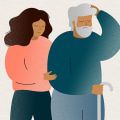Family care generally involves tasks that go beyond helping with activities of daily living, such as bathing, dressing and eating, but also medical or nursing tasks normally performed by a nurse. In my research, focusing on family caregivers of people with Alzheimer's disease and other related dementia in Home Care in Central SC, I found that American caregivers of Chinese and Korean origin often face difficult situations. These include discrimination by health care facilities or providers, feelings of loneliness, and financial problems. Some of these caregivers are even forced to retire early because they struggle to balance work and care responsibilities. LGBTQ+ caregivers of people with dementia face unique stress that leads to worse physical and mental health.
This assistance can alleviate some of the care responsibilities and financial burdens placed on the family caregiver, allowing them to focus on providing care and support to their loved ones without worrying about the cost of essential medical services. For family caregivers of people with dementia, formal support services are particularly crucial so that they can face and overcome the challenges they face. These caregivers can bear a significant burden of disability and chronic illness when caring for others. However, evidence also points to the significant mental and physical cost of providing care, especially for people with young families, professional careers and other social obligations. Caregiving often creates financial burdens because it makes it difficult to keep a full or part-time job, or return to work after taking time off, especially for spouses who care for others.
More recently, the Biden administration proposed the American Families plan, which would guarantee 12 weeks of paid family leave and medical leave for caregivers. As the population ages and disability worsens, it is essential to understand the physical and mental health burden of caregivers, the variety of tasks that caregivers can perform, and the social and economic impacts of chronic diseases or long-term disabilities. A clearer understanding of the types of challenges family caregivers face can lead to solutions that would ease their burden and, at the same time, strengthen the care they provide. By providing new education, resources and support, providers, public health officials and others can help promote a fundamental, but often overlooked, link in the continuity of health care, as the burden of demand continues to increase.
In addition, caregivers aged 70 and older face particular challenges, as they may be dealing with their own health problems. at the same time.



